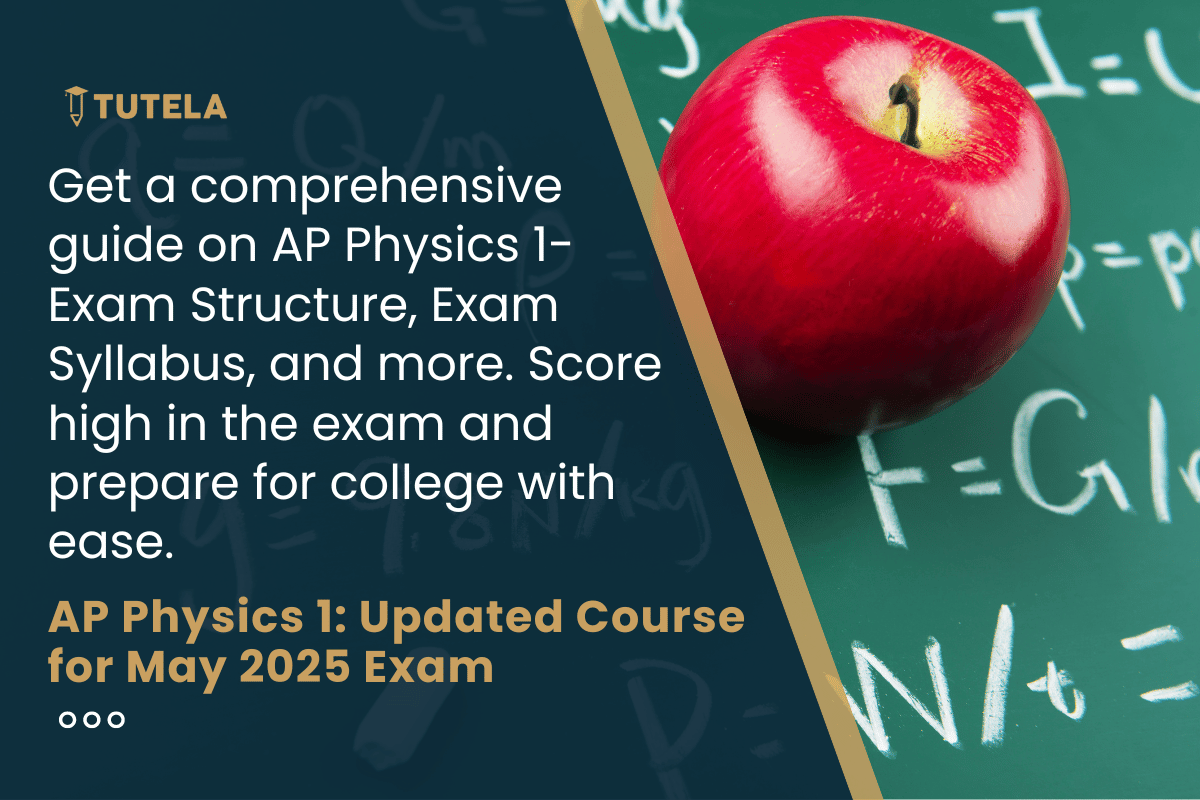
In this blog, we aim to be the go-to guide for students, breaking down the entire syllabus of AP Physics 1 in a concise and engaging manner. From foundational concepts to real-world applications, we'll navigate the essential principles of classical mechanics. The AP Physics 1 Exam for May 2025 has undergone some changes. We have incorporated these changes below. To view changes for AP Physics C Mechanics, click here, and for AP Physics C: Electricity and Magnetism, click here.
| Unit Name | Topics | Weightage in the Exam |
| Unit 1: Kinematics |
|
10-15% |
| Unit 2: Force and Translational Dynamics |
|
18-23% |
| Unit 3: Work, Energy and Power |
|
18-23% |
| Unit 4: Linear Momentum |
|
10-15% |
| Unit 5: Torque and rotational dynamics |
|
10-15% |
| Unit 6: Energy and momentum of rotating systems |
|
5-8% |
| Unit 7: Oscillations |
|
5-8% |
| Unit 8: Fluids |
|
10-15% |
The AP Physics 1 exam for May 2025 has undergone some changes. The updated structure is as follows:
Section I: Multiple-Choice Questions (MCQs)
Section II: Free-Response Questions (FRQs)
Types of Questions:
1. Physics and Astrophysics: AP Physics 1 lays the groundwork for students pursuing majors in physics and astrophysics, providing essential principles for understanding the fundamental laws governing the universe.
2. Mechanical Engineering: Aligned with the curriculum of mechanical engineering majors, the course offers a comprehensive understanding of forces, motion, and energy.
3. Civil Engineering: Understanding the principles of motion and forces is crucial in civil engineering, making AP Physics 1 beneficial for those aspiring to contribute to infrastructure design.
4. Aerospace Engineering: Relevant for careers in aerospace engineering, the course covers dynamics and motion principles fundamental to aircraft and spacecraft design.
5. Computer Science and Engineering: The analytical and problem-solving skills developed in AP Physics 1 complement the requirements of computer science and engineering majors, contributing to success in software and hardware development.
6. Electrical Engineering: Concepts of motion and forces are applicable in electrical engineering, making the course valuable for students interested in understanding the behavior of electrical systems.
7. Applied Mathematics: The integration of mathematical concepts in AP Physics 1 provides a strong background beneficial for students pursuing majors in applied mathematics, where mathematical modeling is essential.
8. Biomedical Engineering: For those interested in the intersection of physics and biology, particularly in understanding the mechanics of living organisms, AP Physics 1 provides relevant insights for biomedical engineering majors.
9. Materials Science: Mechanics plays a crucial role in materials science, and students exploring this field can benefit from the foundational knowledge offered in AP Physics 1.
10. Environmental Science: The course's focus on forces and energy is relevant to environmental science, where understanding the impact of natural processes on the environment is essential for sustainable practices.
TutelaPrep’s College Navigator allows students to search for colleges based on their preferred country and course. Not only that, it also provides valuable insights into each college’s specific admission requirements for those exams. Through College Navigator, you can even connect with alumni at your chosen colleges to get a firsthand feel for campus life and academics.
We hope this article helped you with the subject knowledge. Reach out to us by filling out our assistance form if you need any help with the preparations.